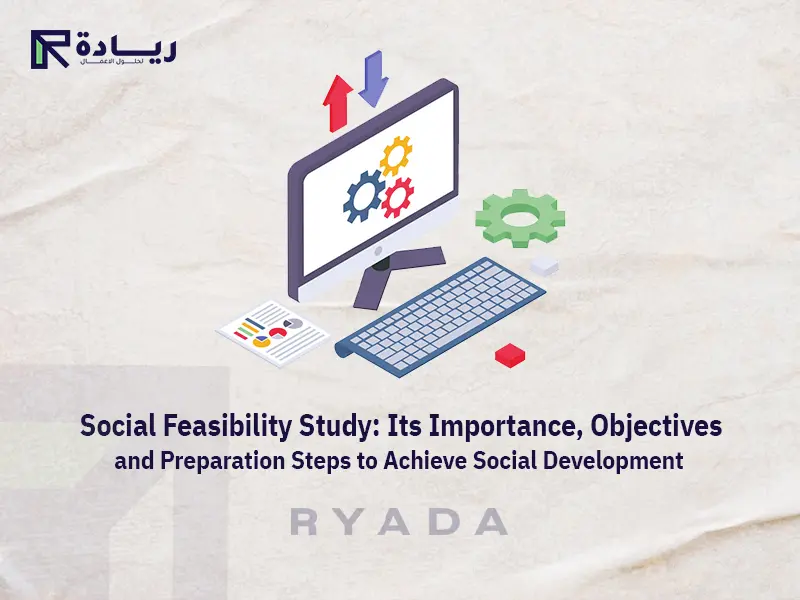What is the social feasibility study?
In today’s era, where social and economic changes are accelerating, the study of social feasibility has become one of the most important tools to help achieve sustainable development. in which it focuses on analysing the social impacts of a particular project on society and contributing to the improvement of quality of life, It is also the key to understanding whether the project will actually serve society and contribute to improving people’s lives. Not only is it a tool to assess the feasibility of enterprises at the economic level, It is a necessary strategic tool that ensures that the project is compatible with society’s needs in all social and humanitarian aspects.
The social feasibility study identifies a set of key objectives that focus on the long-term impacts of projects on society in which it helps to assess the compatibility of the project with society’s needs, Identify the social benefits it will achieve and how to improve the living conditions of the target groups; It also contributes significantly to the analysis of social factors such as the culture of society education, community participation and the impact on health and the environment, thereby contributing to the long-term sustainability of projects and ensuring their success.
As for the steps to prepare the social feasibility study, the collection of accurate social data through field studies is required. Analyse existing social problems and assess ways of addressing them through the proposed project and community consultations and the involvement of local stakeholders may need to be included to ensure that the project responds to their needs, Here, entrepreneurs and entrepreneurs are advised to deal with Riada Business Solutions Company This site contributes to a thorough analysis of the social environment surrounding the project, It promotes the possibility of involving the community in the planning and implementation process s needs, which helps to achieve positive and sustainable outcomes.
Definition of social feasibility study

Social feasibility study is one of the important vital tools that helps many in assessing the social impact of a project or idea before implementing it So if you’re planning to launch a business or grow, the social feasibility study allows you to see if your project will bring tangible social benefits to society or not. s impact on society and the environment, It also focuses on human and social aspects, such as improving quality of life, creating jobs, promoting economic equality and reducing social disparities.
About the social feasibility study, many people may have many questions in mind, such as, how can the project promote community development? Will it contribute to improving the standard of life or not? The answer is simple, and this study always analyses all the social and economic dimensions of the project, thanks to which it is possible to determine whether or not resources will be used effectively to achieve positive outcomes for society.
A social feasibility study is one of the key steps to ensure the success of any project and reduce risks contributing to the assessment of the potential social and economic impacts of the project on the surrounding community, It also helps determine how the project affects the local environment s needs “, such as providing employment, improving living standards and meeting the needs of the population, Besides its role in identifying the challenges that the project may face socially and therefore, it is a vital tool for informed and scientific decision-making that contributes to risk reduction and increases future success chances.
Read also: Technical feasibility study: an essential step towards project success
Differences between social feasibility study and other feasibility studies
The Social Feasibility Study is a special type of feasibility study that focuses on assessing the social impacts of projects and initiatives prior to their implementation, since although there are many other types of feasibility studies focusing on financial and technical aspects, this study always varies greatly in its objectives and tools.
The social feasibility study is linked to the assessment of the project’s expected impact on society in terms of improving the standard of living, both the impact on jobs and the environmental impact, It aims to ensure that the project will contribute positively to the welfare of society in general and, by comparison, other feasibility studies may focus on assessing financial and technical feasibility. feasibility study “, such as a technical and economic feasibility study focusing on financial returns and costs.
In short, we can say that the study of social feasibility is one of the vital and effective tools aimed at improving social conditions, It helps identify factors that may affect society
positively or negatively and contribute to ensuring that future projects benefit individuals and surrounding communities, Compared with other species, we may find them more sustainable and suited to social needs, But it may require deeper thinking about social benefits and their effects away from numbers only.
The primary objective of the social feasibility study
The Social Feasibility Study is undoubtedly one of the important tools used by many individuals, companies and government institutions to assess the social impact of projects. The main objective of this study is to determine the extent of the project’s impact on the community and related social factors, such as improving the standard of living or promoting employment opportunities.
Initially, some social feasibility study may seek to determine the social benefits of the project by analysing its impact on the environment and surrounding society, and these may include, improving public services or providing new jobs, by exploring social needs and determining whether or not the project will contribute to meeting these needs effectively.
The overarching goal of the social feasibility study is to ensure that the project is not limited to economic profits. but also contributes to improving quality of life and achieving sustainable development, By assessing the social impact of the project on the community and the environment with a focus on improving people’s well-being and reducing social disparities, which can contribute to creating an integrated environment that ensures that everyone benefits from the results of the project It makes this study an essential tool to ensure that projects are not only economically viable, but also in society’s long-term interest.
Project Social Feasibility Study
The social feasibility study of projects is a vital tool that contributes to determining the extent of the project’s impact on society in general not only financial and economic accounts, but also social and environmental impact assessments which may make it an essential part of the planning process for any project, This study seeks to understand the compatibility of the project with society’s needs and values as well as its impact on the quality of life and the surrounding environment, thus helping to identify the beneficiaries of the project, while ensuring that any adverse effects that may result therefrom are minimized, It becomes an essential tool for balancing economic success with social sustainability.
By studying social feasibility, entrepreneurs can understand the challenges and opportunities that may arise in society due to the project s social dimensions “, where this study contributes to providing a comprehensive and clear vision of the social dimensions of the project, This helps to make informed decisions that ensure the achievement of the desired goals and identify appropriate actions to promote positive impacts and reduce negative impacts, such as improving employment opportunities or services to society.
The project’s social feasibility study contributes to building excellent relationships with the community by promoting transparency and commitment to social responsibility Not only does it assess economic feasibility, but it also focuses on identifying the long-term impacts of projects on society. guaranteed the success and sustainability of the project by taking into account social and environmental needs, This may make it a necessary step in building future projects that have a positive impact on communities.
Importance of social feasibility study
Today’s social feasibility study has become the focus of attention of many individuals, companies and entrepreneurs, with many questioning its great role and importance in improving quality of life and promoting sustainable development. It is not only a tool for evaluating enterprises, but a means of ensuring positive impact on individuals and communities. How can social feasibility study contribute to building a more sustainable and equitable future? This is what we will recognize in the following lines by mentioning the most important features of this study:
First, improving the standard of living:
The Social Feasibility Study aims to identify the potential social benefits of projects, such as job creation, improvement of public services, and support for the neediest, which, of course, increases quality of life and promotes parity among segments of society.
Reducing the negative impact on the social environment:
When a project is implemented, there may be some negative impacts on the social fabric, and here comes the role of the social feasibility study in anticipating these impacts and providing effective solutions to reduce them, such as preventing discrimination or narrowing communities.
Promoting social sustainability:
Social feasibility studies help to verify the long-term sustainability of projects’ benefits by taking into account the needs of future generations and ensuring the equitable and sustainable use of resources.
Objectives of the social feasibility study
Social feasibility study is one of the key tools aimed at assessing the social impact of a project on the surrounding community This study is a vital element to ensure that the project does not only affect economically, In social terms, this type of study presents several objectives that contribute to determining how the project affects society in general. The most prominent of these are:
Ensuring compatibility between the project and society:
Through the study of social feasibility, it is ensured that the project is in line with the needs of the community, which promotes the project’s acceptance and reduces the likelihood of conflicts or opposition by members of the community.
Improving the distribution of benefits among different social groups:
The Social Feasibility Study aims to equitably distribute the benefits of the project among different segments of society, contributing to reducing economic and social gaps and providing better opportunities for individuals in less privileged communities.
Reduce the social risks associated with the project:
Through social analysis, potential risks such as adverse impacts on the environment or on the lives of individuals in adjacent areas can be identified, thus taking measures to reduce these risks and achieve social balance.
Steps to prepare a social feasibility study
A social feasibility study is the tool used by researchers and specialists to assess the social impact of new projects on the target community, so if you are wondering how to prepare an effective social feasibility study, here are some basic steps that will help you achieve this goal, which may begin with a careful analysis of the project you wish to implement and the social environment it will affect.
First, the preliminary analysis of the project and the target community:
This step requires studying the project in all its aspects and understanding the needs of the target community, where the social problems the project seeks to solve or the challenges it may face must be identified.
Second, collect data on potential impacts:
Through meetings and interviews with community members, you can gather valuable information about the potential impacts of the project, including positive impacts such as improving the standard of life, as well as negative impacts such as increased social tension or environmental changes.
Third, develop a plan to mitigate negative effects and increase benefits:
Based on the data collected, effective strategies must be developed to minimize any negative impacts that may result from the project, and the expected benefits can be enhanced through improved community services or job creation.
Social Benefits of Social Feasibility Study
The social feasibility study is one of the important vital tools that greatly contribute to enhancing the social benefits of projects not only the economic aspect, it extends to several aspects that have a positive impact on society in general. And it works to reflect the ability of projects to improve people’s lives and meet the needs of society sustainably. Here are some of the social benefits of studying social feasibility:
Improving employment and the local economy:
The social feasibility study contributes to identifying areas that can be invested in the community, resulting in the creation of new and innovative jobs. In addition, the projects studied may contribute to the promotion of local economic activity by supporting small and medium-sized industries and increasing access to local resources.
Promoting social cohesion through the project’s initiatives:
The study of social feasibility contributes to the creation of projects with direct social impact, such as education and health initiatives or projects targeting certain groups in society, which helps to promote social cohesion and achieve social justice among different segments of society.
Supporting long-term sustainable development:
By focusing on the environmental and social dimensions, the Social Feasibility Study contributes to ensuring the sustainability of projects, helping to apply innovative solutions that ensure the preservation of the environment and achieve sustainable development that benefits future generations.
Challenges to the social feasibility study
The Social Feasibility Study is one of the key tools to help understand the impact of various projects on society. While it is of the utmost importance for informed and deliberate strategic decision-making, it always faces many challenges that may adversely affect their accuracy and success. The most prominent of these are the following:
Difficulty in obtaining accurate and reliable data:
One of the biggest problems facing the social feasibility study is the difficulty of obtaining accurate information, as a lot of data about population, income, and public services require reliable statistics that can be difficult to access.
Different social impacts on different groups:
It is important to understand how the project affects different social groups, as this variability in effects makes it difficult to assess outcomes comprehensively, especially if the impact varies between geographical regions or demographic groups.
Continuous interaction with the community:
Accuracy of the results of the social feasibility study may require continuous interaction with the community to listen to their needs and ideas, ensuring that studies are adjusted and adapted to social reality.
Importance of community involvement in social feasibility study
Engaging the community in the social feasibility study is one of the key elements that work to ensure the success of any future project and provide effective development solutions And here many people wonder how this is achieved, and the answer is that this participation always contributes significantly and effectively to strengthening the relationship between the parties involved and providing a sustainable environment that reflects positively on all the individuals involved. Here is a review of the importance of this sharing:
Strengthening trust between society and developers:
By involving the community in the study of social feasibility, bridges of trust between local populations and developers can be built, contributing to enhanced cooperation and transparency.
Ensuring sustainability through joint cooperation:
Working with the community ensures that the projects implemented will be more sustainable, as the needs of the environment and society are taken into account, which helps to avoid problems that may arise in the future.
Provide real insights appropriate to the needs of the local population:
Community involvement in the social feasibility study enables the provision of appropriate and integrated solutions tailored to the local population’s needs, ensuring greater and more flexible project success in implementation.
Study on social feasibility and its role in sustainable development

In today’s world, where sustainable development is increasingly important, the Social Feasibility Study emerges as a vital tool that contributes to assessing the impact of projects on society and the environment. It greatly helps to make thoughtful decisions that ensure a balance between economic growth, maintaining the social fabric and protecting the environment. It also contributes to identifying the social benefits and risks of enterprises and guiding them towards the achievement of sustainable development goals.
Impact of projects on the social environment:
The social feasibility study examines the impact of the project on communities, such as improving employment opportunities, promoting education and reducing poverty, which contributes to raising the population’s standard of living and improving social conditions in general.
Adaptation to demographic and economic variables:
The social feasibility study can identify expected changes in the population such as migration or changes in family composition, helping to develop flexible strategies, thereby enhancing enterprises’ ability to adapt to economic changes.
Supporting social and environmental sustainability:
The feasibility study focuses on ensuring that projects do not negatively affect the environment or social fabric, as this study contributes to building sustainable projects and preserves resources for future generations.
Read also: Traditional entrepreneurship: its concept and importance
What is the social feasibility study?
Social feasibility study, an important process aimed at assessing the social impact of a project on society and individuals focus on understanding how the project affects quality of life, Community well-being and sustainable development, and may include identifying some potential social benefits social challenges that may arise “, such as improving education, health or the environment, as well as assessing the social challenges that may arise s needs in an effective and sustainable manner, thereby contributing to the achievement of the goals of inclusive development and the improvement of society’s social conditions.
What is the difference between a feasibility study and an action plan?
The feasibility study is an analysis process aimed at assessing the economic and social feasibility of the project, focusing on identifying success chances, challenges, costing and potential returns, while the plan of action is a detailed document outlining how the project will be implemented after confirmation of its usefulness. The project’s objectives may include implementation strategies, timelines and resources.

